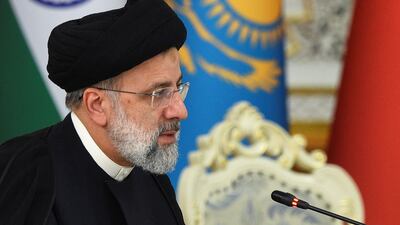Iran joined a rapidly expanding Central Asian security body led by Russia and China on Friday, calling on the countries in the Shanghai Co-operation Organisation to help it form a mechanism to avert sanctions imposed by the West.
The body, formed in 2001 as a forum for Russia, China and ex-Soviet states in Central Asia, expanded four years ago to include India and Pakistan with a view to playing a bigger role as counterweight to western influence in the region.
In a sign of its growing influence, the body's summit in Tajikistan was the first appearance abroad of Iran's new hard-line president, Ebrahim Raisi, since he took office in August.
Mr Raisi hailed the opportunity that membership would provide for Iran, as a country along China's Belt and Road route, to join important trade links across Eurasia. Iranian television described Iran's membership as giving it access to markets across the continent.
In his speech to members, Mr Raisi compared sanctions on Iran to terrorism and said the organisation should design a mechanism that helps Tehran avert them.
Russia and China, along with several western countries, are parties of a 2015 agreement between Iran and world powers under which Tehran agreed to curb its nuclear programme in return for the lifting of sanctions.
Washington abandoned that deal in 2018 and unilaterally reimposed financial sanctions. Negotiations this year to revive it have been stalled since Mr Raisi's election.
“Nothing can stop Iran's peaceful nuclear activities that are within the framework of international regulations,” Mr Raisi said. “Diplomacy is only effective when all parties adhere to it. Threats and pressure tie diplomacy’s hands and render it ineffective.”
The group also discussed Afghanistan, which borders five of the groups' nine members.
China's President Xi Jinping urged “relevant parties” in Afghanistan to eradicate terrorism and promised to provide more help to the war-torn nation. The hard-line Taliban took control of Afghanistan a month ago, leaving many to fear for the future of women's minority rights.
China, which has pledged aid and Covid-19 vaccine doses to Afghanistan, has said the US and its allies have a duty to supply the war-torn nation with economic and humanitarian aid.
Uzbek President Shavkat Mirziyoyev called for talks between the bloc and the Taliban and for efforts to prevent the rise of extremism.
Unfreezing Afghan assets, he said, could help achieve those goals.
“Considering the humanitarian situation, we propose looking into the possibility of lifting the freeze on Afghanistan's accounts in foreign banks,” he said.

